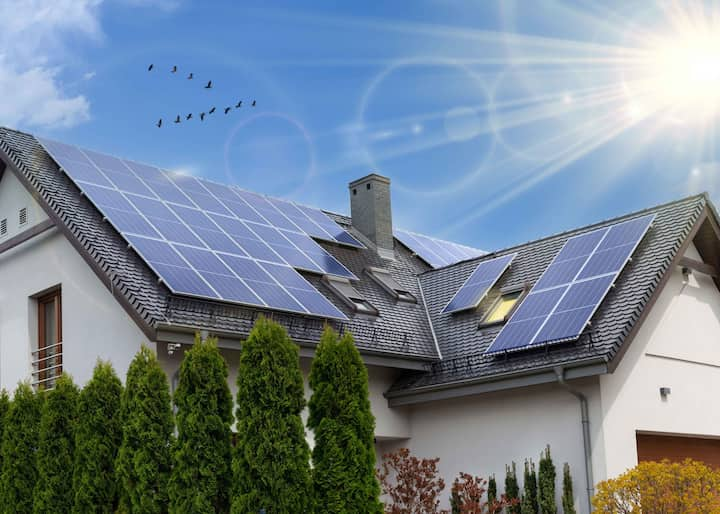Professional solar panel experts in Charlotte
The Sun’s Energy: Harnessing Nature’s Power for a Sustainable Future
In an era marked by environmental urgency, solar energy emerges as a beacon of hope, offering a clean, renewable solution to our escalating energy demands. At the forefront of this sustainable revolution, we stand poised to guide you toward a brighter, greener tomorrow. Welcome to our comprehensive guide to solar energy, where we unravel the intricacies of this transformative technology and empower you to make informed decisions.
Solar Energy: A Clean and Abundant Resource
Solar energy, harnessed from the boundless rays of the sun, presents an inexhaustible source of clean power. Unlike fossil fuels, which release harmful pollutants into our atmosphere and contribute to climate change, solar energy is emission-free, safeguarding our planet and ensuring a healthier future for generations to come.
The Science Behind Solar Technology
At the heart of solar energy lies a remarkable process known as the photovoltaic effect. When sunlight strikes a solar panel, it interacts with specialized materials within the panel, triggering the release of electrons. These electrons, harnessed through electrical circuits, generate a flow of direct current (DC) electricity. This DC electricity can then be utilized directly or converted into alternating current (AC) electricity, compatible with most household appliances and the electrical grid.
Benefits of Solar Energy: A Brighter Outlook
- Reduced Energy Costs: Solar panels can significantly lower your electricity bills by generating your own clean energy. Over time, these savings can accumulate into substantial financial benefits.
- Increased Energy Independence: With a solar system, you gain a greater degree of control over your energy consumption. You are less reliant on external energy sources and potential fluctuations in energy prices.
- Environmental Protection: By choosing solar energy, you actively contribute to the fight against climate change. Every kilowatt-hour of solar electricity generated displaces the need for fossil fuel-based generation, reducing greenhouse gas emissions and promoting a healthier environment.
- Government Incentives: Many governments offer financial incentives and tax credits to encourage the adoption of solar energy. These incentives can further reduce the upfront costs of installing a solar system, making it a more accessible option.
- Increased Property Value: Homes equipped with solar systems are often perceived as more desirable by potential buyers. Solar panels add value to your property, giving you a competitive edge in the real estate market.
Choosing the Right Solar System: A Tailored Approach
Selecting the ideal solar system for your specific needs requires careful consideration of several key factors:
Type of Solar Panels:
- Monocrystalline: Highly efficient, durable panels with a sleek black appearance.
- Polycrystalline: Slightly less efficient but more affordable panels with a bluish hue.
- Thin-Film: Flexible and lightweight panels suitable for unique applications.
Size of the System:
Determined by your energy consumption and the available space on your property.
Inverter Type:
- String Inverter: A cost-effective option for smaller systems.
- Microinverter: Provides greater efficiency and monitoring capabilities for larger systems.
Mounting System:
- Rooftop Mount: Utilizes your roof space for solar panel installation.
- Ground Mount: Freestanding structures suitable for larger systems and open areas.
Professional Solar Installation: Safety and Efficiency
The installation of a solar system is a critical step that should be entrusted to experienced and certified professionals. Improper installation can compromise the performance and safety of your system.
FAQs: Unraveling the Mysteries of Solar Energy
- How much does a solar system cost? The cost of a solar system varies depending on factors such as system size, panel type, and installation complexity.
- Can I install a solar system myself? While DIY solar installations are possible, it is strongly recommended to hire certified professionals for optimal performance and safety.
- How long do solar panels last? Most solar panels have a lifespan of 25 to 30 years, ensuring long-term savings and energy production.
- Do solar panels require maintenance? Minimal maintenance is required, typically involving periodic cleaning and inspections to ensure optimal performance.
- What happens to solar energy at night? Solar panels generate electricity only during daylight hours. To utilize solar energy at night or during power outages, backup batteries can be integrated into the system.
Conclusion: Embark on Your Solar Journey
The transition to solar energy is a transformative decision, paving the way for a more sustainable and cost-effective energy future. By harnessing the sun’s limitless power, you not only save money but also contribute to a cleaner and greener planet. Take the first step toward your solar journey today and experience the transformative benefits of this renewable energy source.

Get Your Fast, Competitive Solar Panel Estimate
1. Call us or Complete our Estimate Form
Our calls and form completions are complimentary to you. You can feel confident that your home will be in great hands with one of our network professionals.
2. Connect with a local Charlotte solar panel installation expert
Completing our form is great if you are busy right now and want someone to get back to you at a later time. A call will connect you with a solar panel professional quicker. Receive your competitive estimate; often you can receive an estimate right on the phone call, sometimes a little more discovery is involved, and the solar panel pro might want to do some basic inspections before giving the estimate.